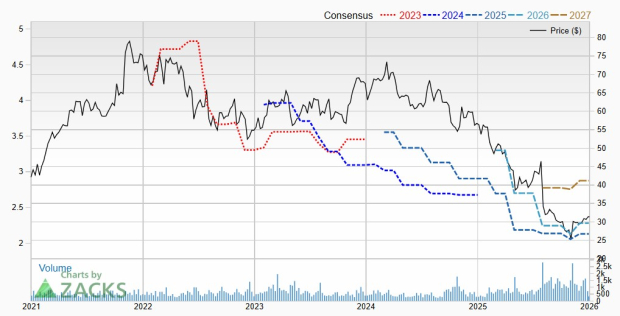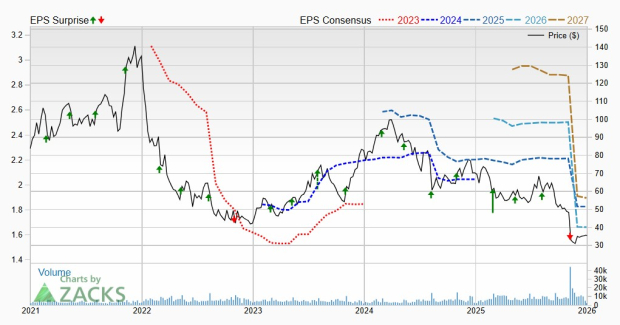The Boeing Company’s (BA) production challenges have echoed across the airline industry, posing challenges for carriers to satisfy surging travel demand and potentially driving ticket prices even higher. That said, shares of Southwest Airlines Co. (LUV), one of the world’s largest operators of the Boeing fleet, have taken a significant hit.
Investor sentiment soured toward the stock as Boeing’s quality control issues led to delays in airplane deliveries, prompting Southwest to lower its expectations, with anticipated Boeing 737-8 deliveries for 2024 reduced from 58 to 46. Amid the uncertainty, the stock recently received a “Hold” rating from HSBC. That’s in line with the Wall Street consensus; out of 20 analysts tracking LUV, 45% rate the stock a “Hold.”
On the other hand, noting a positive demand trend for 2024 driven by a recovery in both business and leisure travel, HSBC analysts believe three airline stocks, Delta Air Lines, Inc. (DAL), United Airlines Holdings, Inc. (UAL), and American Airlines Group Inc. (AAL) are worth considering now and rated them as “Buy.”
Let’s take a closer look at these stocks.
Airline Stock #1: Delta Air Lines
With a market cap of $33.9 billion, Atlanta-based Delta Air Lines, Inc. (DAL) provides scheduled air transportation for passengers and cargo domestically and internationally. Established in 1924, Delta Air Lines has significantly expanded its reach, offering a world-class customer experience across more than 4,000 daily flights to over 280 destinations spanning six continents.
Shares of Delta Air Lines have rallied 47.3% over the past 52 weeks and 46.8% over the past six months.

On April 25, Delta Air Lines declared a quarterly dividend of $0.10 per share, payable to its shareholders on June 4. The company’s annualized dividend of $0.40 translates to a 0.76% dividend yield.
Priced at 7.97 times forward earnings and 0.59 times sales, the stock trades much lower than the passenger airlines industry median and its own five-year averages.
Shares of Delta Air Lines soared after the company reported its Q1 earnings results on April 10, buoyed by robust travel demand as the summer vacation season heats up. The company’s total operating revenue of $13.8 billion rose 7.8% annually, exceeding Street estimates by nearly 7.5%, while its non-GAAP profit of $0.45 per share spiked 80% year over year, also topping predictions by an impressive 25%.
CEO Ed Bastian pointed out that despite recent issues with flights and increased scrutiny of Boeing, he hasn’t seen a dent in demand, calling it the healthiest ever. While over half of Delta Air Lines’ 950+ fleet are Boeing models, the airline has recently favored Airbus (EADSY), including a January order for 20 A350s. This strategic move has allowed Delta to dodge the challenges plaguing many of its industry peers.
For fiscal Q2, management expects revenue growth between 5% and 7% year over year. Its operating margin is projected to be between 14% and 15%, while EPS is forecasted to range between $2.20 and $2.50. For fiscal 2024, EPS is projected to be between $6 and $7.
Analysts tracking Delta Air Lines predict the company’s profit to reach $6.66 per share in fiscal 2024, up 6.6% year over year, and grow another 13.7% to $7.57 per share in fiscal 2025.
In addition to flagging a “Buy” rating, HSBC analyst Achal Kumar set a $72.80 price target on Delta Air Lines, which implies an upside potential of 37.8%. Kumar emphasized its robust hub network and growing revenue from premium cabins. Delta Air Lines’ non-unionized labor model, favorable employee relations, strong financial health with a net debt/EBITDA ratio of 2.7, and projected 11.4% annual free cash flow yield over the next four years were key factors driving the positive outlook.
Delta stock has a unanimous “Strong Buy” rating from all 17 analysts covering the stock.

The average analyst price target of $59.16 indicates a relatively modest upside potential of 11.9% from current levels. However, the Street-high price target of $85 suggests that the stock could rally as much as 60.8% from the current levels.
Airline Stock #2: United Airlines
Valued at a market cap of $18 billion, Chicago-based United Airlines Holdings, Inc. (UAL) offers air transportation services. The company transports passengers and cargo through its mainline and regional fleets. Plus, it provides catering, ground handling, flight training, and maintenance services to third parties.
Shares of United Airlines have surged 33.4% on a YTD basis and 38.4% over the past six months.

In terms of valuation, the stock is trading at 5.55 times forward earnings and 0.34 times sales, lower than the industry median and its five-year averages.
United Airlines shares jumped 17.5% on April 17, propelled by the company’s impressive Q1 earnings results, which outpaced Wall Street expectations on the top and bottom lines, despite Boeing-related obstacles. The company’s total operating revenue increased 9.7% year over year to $12.5 billion, exceeding analysts’ predictions marginally. Its adjusted loss per share narrowed to $0.15, smashing Wall Street’s forecast by a remarkable 71.7%.
Moreover, the company’s pre-tax loss was reduced to $164 million, a solid improvement from the previous year’s pre-tax loss of $256 million, highlighting the company’s resilience in navigating challenging circumstances.
The company would have achieved a profitable quarter, excluding the impact of a $200 million hit from the Boeing 737 MAX 9 aircraft grounding. CEO Scott Kirby underscored the significance of the airline’s operational excellence and strategic fleet management adjustments as crucial drivers behind the success of its Q1 performance.
For fiscal 2024, the company reiterated its adjusted EPS forecast, expecting it to be between $9 and $11. Analysts tracking United Airlines expect the company’s profit to reach $9.93 per share in fiscal 2024 and surge 15% year over year to $11.42 per share in fiscal 2025.
HSBC analyst Kumar set a price target of $69.20 on United Airlines, which suggests that the stock could rally as much as 26%. He cited the airline’s strong international market position and operational strengths, and expects improved profitability despite capital expenditures.
United Airlines stock has a consensus “Strong Buy” rating overall. Out of the 19 analysts covering the stock, 13 recommend a “Strong Buy,” one advises a “Moderate Buy,” and the remaining five give a “Hold” rating.

The average analyst price target of $63.29 indicates a modest potential upside of 15.1% from the current price levels. However, the Street-high price target of $98 suggests a notable 78.3% upside potential.
Airline Stock #3: American Airlines
Headquartered in Texas, American Airlines Group Inc. (AAL) was formed in December 2013 following the merger of American Airlines and US Airways Group. Valued at a market cap of $9.7 billion, this airline company is a founding member of the Oneworld alliance, whose members serve more than 1,000 destinations with about 14,250 daily flights to over 150 countries.
Shares of American Airlines have climbed 8.6% on a YTD basis and 21% over the past six months.

The stock is trading at 5.97 times forward earnings, much lower than the industry median. Additionally, priced at 0.19 times sales, the stock trades at a discount to both its industry median and its own five-year average, respectively.
On April 25, American Airlines disclosed its Q1 earnings results, which missed Wall Street predictions. Like many of its industry peers, the company’s Q1 performance took a hit due to Boeing’s latest quality control and safety crises.
While the company swung to a loss of $0.34 per share on an adjusted basis, on the brighter side, its Q1 total operating revenue of $12.6 billion rose 3.1% annually. American Airlines managed to slash total debt by nearly $950 million, bringing it over 80% closer to the company’s 2025 total debt reduction goal.
Despite expressing dissatisfaction with the Q1 performance, CEO Robert Isom highlighted the company’s strong foundation and commitment to meeting full-year targets. Management anticipates a profitable rebound for the company in Q2, projecting adjusted EPS between $1.15 and $1.45. Plus, American Airlines reaffirmed its fiscal 2024 adjusted EPS range between $2.25 and $3.25.
Analysts tracking American Airlines expect the company’s profit to come in at $2.54 per share in fiscal 2024 and improve 25.2% year over year to $3.18 per share in fiscal 2025.
Analyst Kumar set a price target of $17.90 on American Airlines, indicating an upside potential of nearly 21%. He highlighted the airline company’s strong Atlantic and Latin America market positions, its beneficial Alaska Airlines (ALK) partnership, and 64% domestic capacity deployment, which is higher than its peers.
American Airlines stock has a consensus “Moderate Buy” rating overall. Out of the 18 analysts covering the stock, 10 recommend a “Strong Buy,” six advise a “Hold,” one suggests a “Moderate Sell,” and the remaining one gives a “Strong Sell” rating.

The average analyst price target of $17.16 indicates a modest potential upside of about 16% from the current price levels. However, the Street-high price target of $24 suggests that the stock could rally as much as 61.7%.
On the date of publication, Anushka Mukherji did not have (either directly or indirectly) positions in any of the securities mentioned in this article. All information and data in this article is solely for informational purposes. For more information please view the Barchart Disclosure Policy here.
The views and opinions expressed herein are the views and opinions of the author and do not necessarily reflect those of Nasdaq, Inc.








